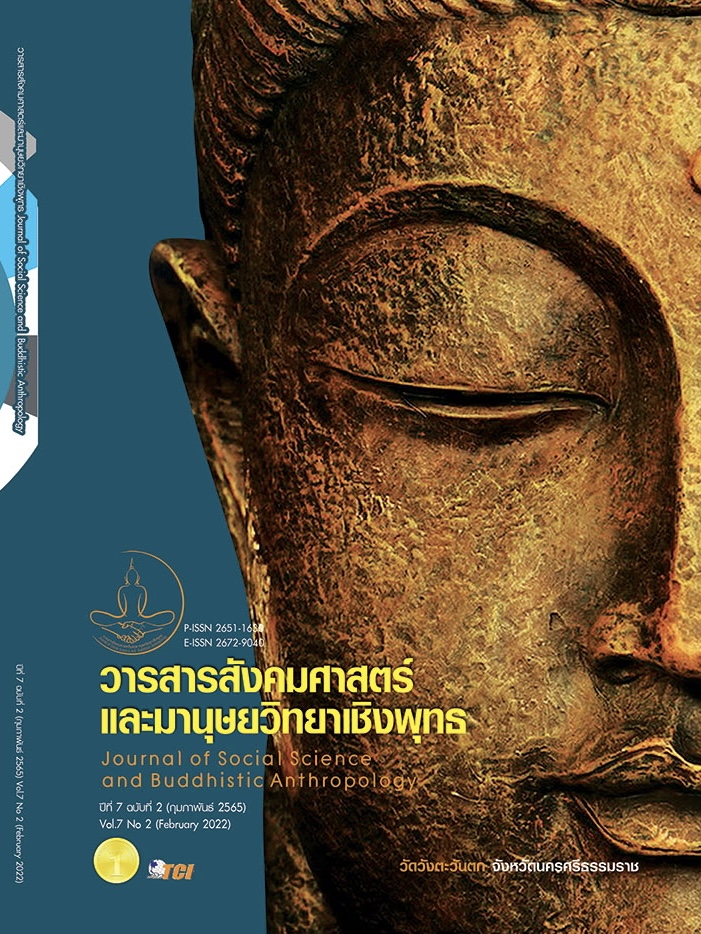THE DEVELOPMENT OF SCHOOL BOTANICAL GARDEN CURRICULUM ON LOCAL PLANTS FOR PRIMARY YEARS G5
Keywords:
Curriculum Development, School Botanical Garden, Local PlantsAbstract
The objectives of this research article were to: 1) study basic information for develop of the School Botanical Garden curriculum on the topic of Local plants. 2) develop and ensure the suitability of the School Botanical Garden curriculum draft on the topic of Local plants. 3) experiment School Botanical Garden curriculum on the topic of Local plants and 4) evaluate and quality assurance School Botanical Garden curriculum on the topic of Local plants. Mixed methods research. They were 44 administrators, teachers, educational supervisors, committees of basic academic school, local leaders, representative parents, local experts, 9 focus experts, and 40 students of the experimental group. The samples consisted of 93 informants. All samples were selected by Purposive random sampling. The instruments used in this research were: 1) School Botanical Garden curriculum on the topic of Local plants, 2) Learning skill test 3) Behavior in scientific process observation 4) satisfaction questionnaire 5) Focus Group Discussion record. The statistics used for data analysis were percentage, mean (), and standard deviation (S.D.). The results were as follows: 1) The accordance and suitability in School Botanical Garden curriculum on the topic of Local plants were at the highest level. 2) The development and ensure the suitability of the School Botanical Garden curriculum draft on the topic of Local plants were at the highest level. 3) The experiment of School Botanical Garden curriculum on the topic of Local plants was found that Learning skill of students in scientific process was at the highest level. The behavior of students in the scientific process was at the highest level, and Students ‘satisfaction towards learning in the School Botanical Garden curriculum on the topic of Local plants was at a high level. 4) The evaluation of quality assurance in the School Botanical Garden curriculum on the topic of Local plants was at its highest as a whole.
References
กระทรวงศึกษาธิการ. (2560). หลักสูตรแกนกลางการศึกษาขั้นพื้นฐานพุทธศักราช 2551 (ฉบับปรับปรุง 2561). กรุงเทพมหานคร: องค์การรับส่งสินค้าพัสดุภัณฑ์ (ร.ส.พ.).
โครงการอนุรักษ์พันธุกรรมพืชอันเนื่องมาจากพระราชดำริ สมเด็จพระเทพรัตนราชสุดาฯ สยามบรมราชกุมารี (อพ.สธ.). (2559). แผนแม่บท โครงการอนุรักษ์พันธุกรรมพืชอันเนื่องมาจากพระราชดำริ สมเด็จพระเทพรัตนราชสุดาฯ สยามบรมราชกุมารี (อพ.สธ.). กรุงเทพมหานคร : สยามพริ้นท์ จํากัด.
ชัยวัฒน์ สุทธิรัตน์. (2559). หลักสูตรในศตวรรษที่ 21. นนทบุรี: พีบาลาซ์ดีไซด์แอนปริ้นติ้ง.
ทวิช ลักษณ์สง่า. (2556). การพัฒนาหลักสูตรรายวิชาเพิ่มเติมการศึกษาท้องถิ่น สำหรับนักเรียนชั้นมัธยมศึกษาปีที่ 4. ใน วิทยานิพนธ์ศึกษาศาสตรมหาบัณฑิต สาขาหลักสูตรและการนิเทศ. มหาวิทยาลัยศิลปกร.
นภาภรณ์ ธัญญา. (2563). การพัฒนาหลักสูตรทางด้านวิทยาศาสตร์ของนักเรียนระดับประถมศึกษาสำหรับทักษะแห่งศตวรรษที่ 21. กรุงเทพมหานคร: มหาวิทยาลัยเวสเทิร์น.
ประสาท เนืองเฉลิม. (2553). หลักสูตรการศึกษา. มหาสารคาม : มหาวิทยาลัยมหาสารคาม.
เพชรปาณี อินทรพาณิชย์. (2558). การพัฒนาหลักสูตรเสริมเพื่อเสริมทักษะการคิดวิเคราะห์ สำหรับนักเรียนระดับชั้นประถมศึกษาปีที่ 6 โรงเรียนอนุบาลสกลนคร. วารสารมหาวิทยาลัยครพนม, 7(1), 125-128.
ศรีเอี่ยมอนุสรณ์. (2563). หลักสูตรสถานศึกษาโรงเรียนศรีเอี่ยมอนุสรณ์. กรุงเทพมหานคร: โรงเรียนศรีเอี่ยมอนุสรณ์.
สำนักงานเลขาธิการสภาการศึกษา. (2560). แผนการศึกษาแห่งชาติ พ.ศ. 2560 – 2579. กรุงเทพมหานคร: พริกหวานกราฟฟิค จำกัด.
สุเทพ อ่วมเจริญ. (2558). การพัฒนาหลักสูตร : ทฤษฎีและการการปฎิบัติ. นครปฐม: มหาวิทยาลัยศิลปากร วิทยาเขตสนามจันทร์.
อดิศร ศิริ. (2563). การพัฒนาหลักสูตรทางด้านคณิตศาสตร์ สำหรับนักเรียนที่มีความสามารถ พิเศษในระดับมัธยมศึกษาตอนปลาย. กรุงเทพมหานคร: มหาวิทยาลัยเวสเทิร์น.
Bennett, L. A. et al. (2008). Couples at risk for transmission of alcoholism: Protective influences. Family Process, 26(1), 111-129.
Yee Mei Heong et al. (2012). The meeds analysis of learning hingher order thinking skills for generating ideas. Social and Behavioral Sciences., 59(2012), 197-203.
Downloads
Published
How to Cite
Issue
Section
License
Copyright (c) 2022 Journal of Social Science and Buddhistic Anthropology

This work is licensed under a Creative Commons Attribution-NonCommercial-NoDerivatives 4.0 International License.









